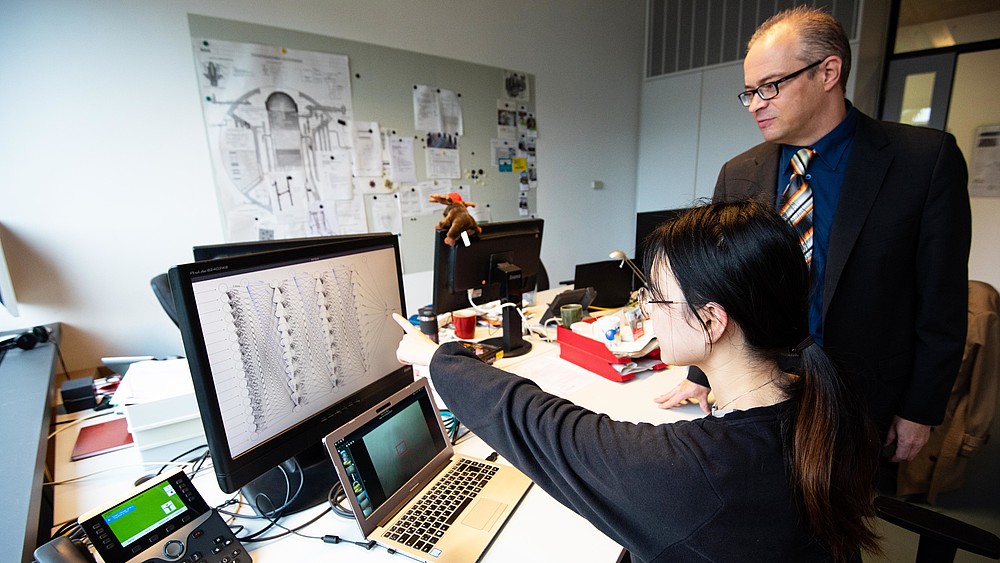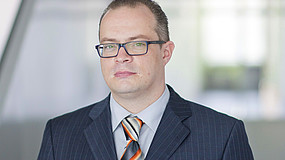The IAESTE exchange program took student Aijia Wei from Shanghai to Zittau.

If you can't last one lane in the swimming pool, you won't graduate. The rules at the University of Shanghai are as simple as that - and yet so difficult for some students. Aijia Wei, an exchange student from China on the IAESTE program, shared some of the exciting and curious peculiarities of her home city with colleagues from the Institute of Process Engineering, Process Automation and Metrology (IPM) in her presentation at the colloquium at the end of September.
Ms Weis' two-month internship on the topic of "Image-based detection of damage
on rubberized rollers", supervised by Dr.-Ing. André Seeliger (IPM), tells us a lot about the paths of industry and people in today's globalized world. With its 20 million inhabitants and tourist magnets such as the Orient Pearl Tower, the fifth largest television tower in the world, Shanghai has just as much to offer as Zittau, with its fasting cloth and natural beauty wherever you look. To relax from everyday life in the city, residents like to go to the Yu Garden, which reveals a lot about Chinese traditions with its teachings on the inner harmony between architecture and nature. Ms. Weis' practical topic, on the other hand, is about looking to the future, both in the Far East and in Upper Lusatia.
She deals with "artificial intelligence" (AI), an area of research that many people associate with vague images. Her work is classified as "weak AI", which refers to concrete applications of machine learning. The programmed artificial neural network learns independently how to deal with newly emerging problems. Intelligent behavior is thus simulated with the help of algorithms that Ms Wei has implemented in the Python programming language.
But working on a laptop alone would not have produced any presentable results. Instead, she went to her practical partner, the traditional company Küsters-Textile from Zittau, which develops and produces machines for finishing (dyeing, bleaching, mercerizing) textiles. Küsters is now part of the international Benninger Group, which also happens to have a branch in Ms. Weis' home town of Shanghai. Rollers several meters long, coated with a layer of rubber, arrive at the plant in Zittau from suppliers and previously had to be checked manually and laboriously for defects in the coating.
In order to automate this process in the future, Ms. Wei had a lot to do. First, she had to analyze the different types of defects. She had to categorize possible damage patterns such as holes and cracks so that these could be learned by the AI later on. The camera was then taken to the factory, where the surface of several rubberized rollers was photographed piece by piece. The training for her neural network then began with this image data.
Ms. Wei did not have to pass a swimming test to successfully complete her specialist internship at the HSZG; this only awaits her at the end of her studies in Shanghai. The inhabitants do not have much to fear from the adjacent sea. In her lecture, she used weather maps to show that the metropolis is also known as the city of "typhoon magic" due to its scientifically inexplicable luck. Storms often turn just before the city limits and move in a different direction. A nice parallel between Zittau and Shanghai, because according to legend, Upper Lusatia also has little to fear from storms and other calamities, as it in turn is protected by the "Blue Stones".
The colleagues from the IPM rewarded Ms Wei's presentation with a round of applause and Project Manager Dr. Clemens Schneider presented items from the HSZG's campus store as a gift. After the two-month internship, the first step towards the possible use of AI in a traditional company in Upper Lusatia has been taken and both colleagues and students have been given the gift of both specialist knowledge and an understanding of the world in the border triangle and the Asian metropolis.
You can find more information about the IAESTE exchange program for professional internships in more than 90 countries around the world on the following page.
